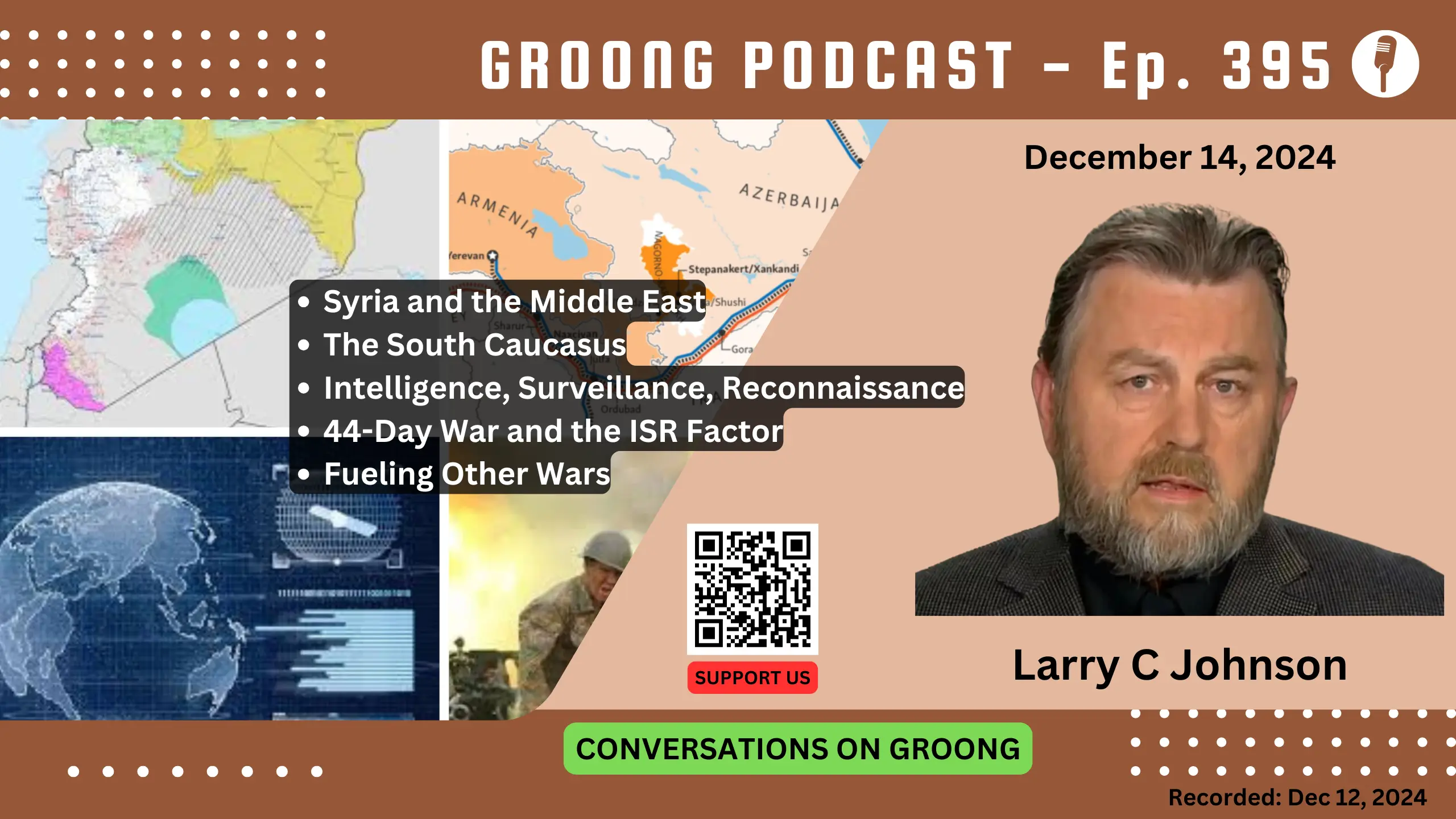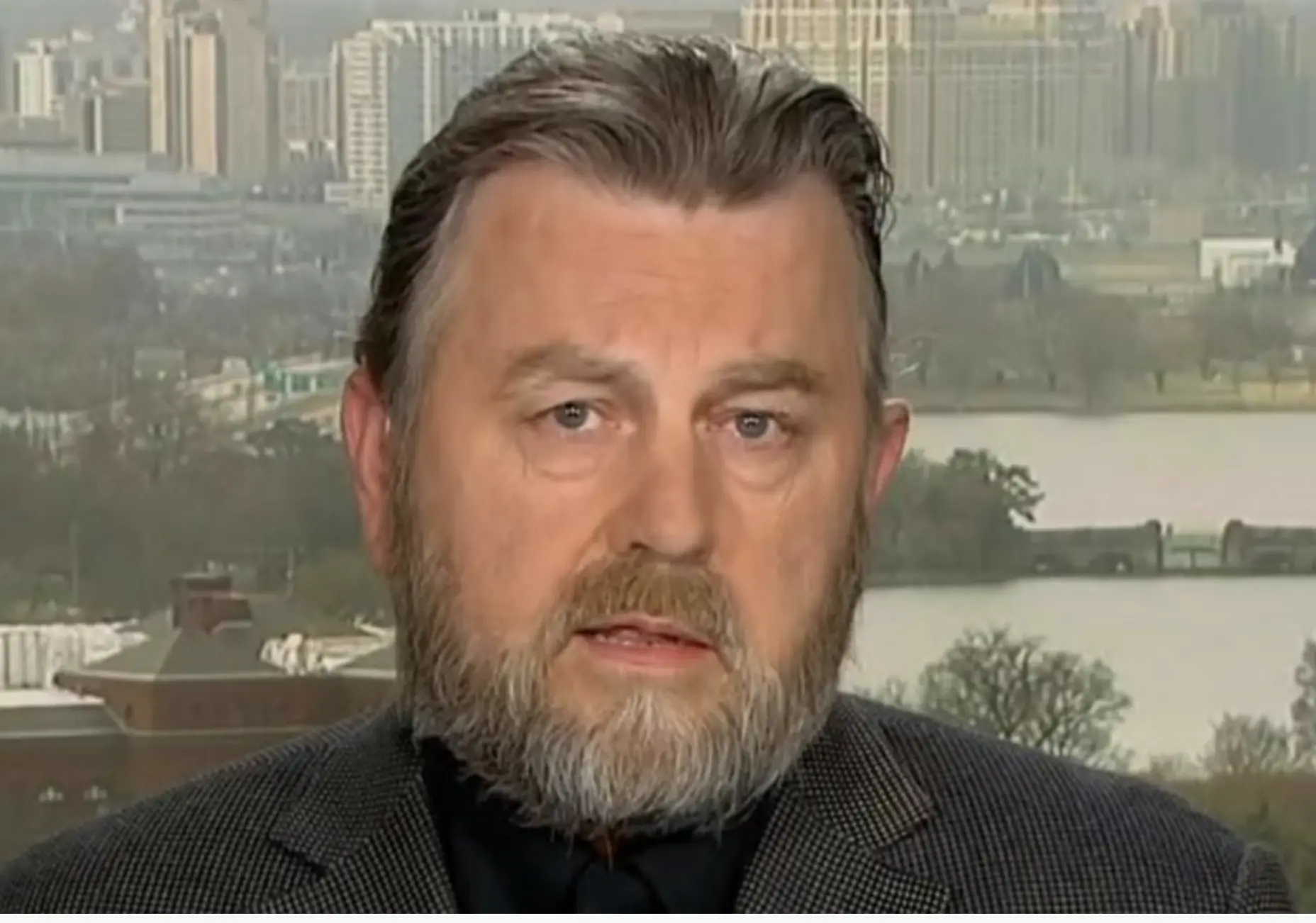Larry C Johnson - Syria, South Caucasus, and Regional Power Dynamics | Ep 395, Dec 14, 2024 [EP395]
Posted on Saturday, Dec 14, 2024 | Category: Middle East, Armenia, Politics | Series: cog, video
Groong Links:
Guest:
Topics:
- Syria and the Middle East
- The South Caucasus
- Intelligence, Surveillance, Reconnaissance
- 44-Day War and the ISR Factor
- Fueling Other Wars
Episode 395 | Recorded: December 12, 2024
Show Notes
Syria and the Middle East
So Syria happened… The terrorists are now forming a government in Syria.
Let’s cut to the chase.
Questions:
- Did the Russian and Iranian intel services miss this, or do you think there were some backroom deals that maybe predetermined the current outcome?
- Russia projects much of its power into the Mediterranean and North Africa through its naval base in Tartus. Reportedly they have reached an agreement with HTS to keep that base in Russian hands. Do you think that’s a sustainable agreement, and can Russia regain a foothold in the eastern Mediterranean if they lose that base?
- What was Turkey’s role in this Hayat Tahrir al-Sham (HTS) and their allies offensive?
- How do you expect the situation in Syria to evolve?
The South Caucasus
The South Caucasus remains a critical region where global and regional powers intersect, creating a volatile geopolitical environment. Following Azerbaijan’s attack on Nagorno-Karabakh in 2020, analysts warned of a potential escalation targeting the southern regions of Armenia, particularly the two southern provinces, Syunik and Vayots Dzor, which Turkey and Azerbaijan call their “Zangezur corridor.”
Azerbaijan and Turkey are adept at using global crises to initiate land grabs, just like they decided to start the 2020 war amidst COVID, and the US presidential elections. And of course Turkey’s involvement in Syria is another prime example of this “carpe diem” modus operandi. We should note that Azerbaijan’s president, Ilham Aliyev has joined Erdogan in “congratulating” Syrians for the toppling of Assad.
Now the so-called “Zangezur corridor” holds strategic significance, not only for Azerbaijan and Turkey’s pan-Turanic ambitions but also for Israel, which maintains a close symbiotic relationship with Azerbaijan through arms and energy trade. Israel’s goal is to have military and intelligence assets right on Iran’s borders from every side possible, in this case its northern border.
- Leaked state department memos describe the externally visible part of the Israeli - Azerbaijan relationship as only the tip of the iceberg.
Amidst all the developments in Syria, few analysts are paying much attention to what might happen next around Armenia. Only Douglas Macgregor, in a recent podcast with Daniel Davis, brought up that threat.
Questions:
- Could what happened in Syria embolden Turkey and Azerbaijan to push for a territorial grab in Armenia, and create a de-facto corridor and adjacency for themselves?
Iran is keenly aware of the pan-Turanic threat and has defined red lines around Armenia’s territorial integrity. Russia meanwhile suggested that its border guards be stationed on the corridor instead as defined in the Nov 9-10 statement which paused the 2020 war. Some analysts explain that Russia is primarily concerned about Ukraine and is not interested in opening a 2nd front. So their aim is to “freeze” the current situation and address the threats from Turkey-Azerbaijan perhaps in the future.
So Armenian watchers are quite concerned right now about what might happen if Turkey & Azerbaijan try for a land grab in Armenia. Will Russia make another decision in favor of “not opening a 2nd front” and will Iran by itself be able to counter such a threat by itself?
Questions:
- Should Russia be more concerned with a pan-Turanic project?
Intelligence, Surveillance, Reconnaissance
In modern warfare, Intelligence, Surveillance, and Reconnaissance (ISR) has become a cornerstone for achieving strategic and tactical dominance on the battlefield. As you highlighted in a 2023 article on your website, sonar21.com, ISR enables real-time situational awareness, facilitates precision strikes, and ensures efficient coordination of forces. In fact, you’ve likened it to the “Eye of Sauron”.
Questions:
- In today’s high-tech battlefield, how critical is ISR in determining the outcome of a conflict? Can you give examples of recent wars where ISR played a decisive role?
- NATO is known for its sophisticated ISR capabilities. Could you elaborate on how NATO integrates ISR into its military operations, and what makes its ISR network stand out compared to other global powers?
- Do other world powers, like Russia, China, India, even Israel, have similar ISR capabilities?
NATO’s Joint Intelligence, Surveillance, and Reconnaissance (JISR) capabilities are vital for modern military operations, offering situational awareness across land, air, sea, space, and cyber domains. By integrating data from national assets like satellites and drones, NATO provides timely, accurate intelligence while promoting operational efficiency and member state interoperability.
Questions:
- Considering NATO’s emphasis on the “need to share” over the “need to know,” what are the primary challenges the Alliance faces in achieving seamless ISR data sharing among member nations? Is this sharing done by default?
- How does NATO address security concerns and technological constraints to facilitate effective intelligence sharing? Are there appropriate checks and balances and authorizations, to control inappropriate use of NATO resources?
44-Day War and the ISR Factor
Azerbaijan’s war on Nagorno-Karabakh in 2020 reshaped the South Caucasus, leading to the ethnic cleansing of 150,000 Armenians. Unlike previous conflicts, analysts argue that Turkey’s involvement was pivotal if not outright decisive. Notably, reports suggest that Armenian air defenses suffered significant losses within the first hour of the war through precision strikes, raising questions about Turkey’s role and potential use of NATO ISR capabilities.
Questions:
- How plausible is it that Turkey leveraged NATO ISR resources and assets to assist Azerbaijan during the 2020 war on Nagorno-Karabakh?
- Did they have tacit permission from NATO to proceed or was it solely a Turkish initiative?
- How likely is it that Turkey, as a NATO member, could exploit interoperability protocols within the Alliance to gain access to ISR capabilities without explicit approval, potentially justifying their use as part of training or testing exercises? Could NATO’s decentralized structure and reliance on trust among members inadvertently enable such actions?
- Note: because if you recall, Turkey held military exercises with Azerbaijan right before the war, a bunch of F16s were deployed in Azerbaijan, and then they were not brought back to Turkey after the drills. In fact reportedly they patrolled the air space over Azerbaijan right along its border with Armenia.
- In your view, what evidence would be necessary to confirm or rule out NATO ISR involvement in Turkey’s support for Azerbaijan?
Fueling Other Wars
Karen Kwiatkowski, who was our guest last week, said she believes that the Trump administration will cut financing to Ukraine but she also cautioned that the US deep state, which is much more powerful than Trump, will be able to divert the savings from Ukraine to other wars.
Questions:
- What are your thoughts about Kwiatkowski’s concerns?
- What are some of the other areas around the world, militarily, that are of interest to the US deep state?
During his first term, Trump tried to pull out US forces out of Syria, which are protecting the US-allied Kurds there, but according to reports the deep state essentially went behind his back and did everything to prevent this from happening. Meanwhile, Turkish forces which are now on the ground in Syria are very much interested in pushing the Kurds out of the region. And in a recent interview you said that you don’t think Trump will pull the remaining US forces out of Syria.
Questions:
- Can you elaborate for our listeners why you think Trump will keep US forces in Syria?
- Does this present a risk for military confrontation between Turkish and US forces there?
Wrap-up
That’s our show! We hope you found it useful. Please find us on Social Media and follow us everywhere you get your Armenian news.
Thanks to Laura Osborn for the music on our podcasts.
Guests

Larry C Johnson
Larry C Johnson is a former intelligence officer and expert on issues related to terrorism, national security, and foreign policy. As a CIA analyst in the 1980s Johnson was engaged in issues related to terrorism and security. He then worked at the US State Department’s Counterterrorism Office. Johnson has since worked as a political consultant and commentator on issues related to terrorism and security. He’s known for his critical attitude towards US foreign policy and intelligence practices.
Hosts

Hovik Manucharyan
Hovik Manucharyan is an information security engineer who moved from Seattle to Armenia in 2022. He co-founded the ANN/Groong podcast in 2020 and has been a contributor to Groong News since the late 1990s.
Disclaimer: The views expressed by Hovik Manucharyan on the ANN/Groong podcast are his own and do not necessarily reflect the opinions of his employer or any other organization.

Asbed Bedrossian
Asbed Bedrossian is an IT professional, and for years oversaw the central IT enterprise infrastructure and services at USC. His decades of experience spanned across IT strategy, enterprise architecture, infrastructure, cybersecurity, enterprise applications, data center operations, high performance computing, ITSM, ITPM, and more.
Asbed founded the Armenian News Network Groong circa 1989/1990, and co-founded the ANN/Groong podcast in 2020.